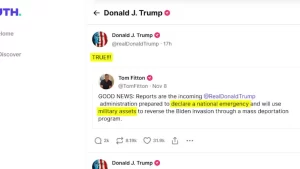President-elect vows to carry out the largest deportation effort in U.S. history, leveraging emergency powers and military support to target millions of undocumented immigrants.
By: Abbas Changezi
President-elect Donald Trump plans to declare a national emergency on his first day in office to initiate mass deportations of undocumented immigrants. He aims to deploy the U.S. military as part of his strategy to tackle illegal immigration.
On Truth Social, Trump confirmed the reports by stating that the information is “TRUE!!!” He intends to utilize federal resources, including emergency powers and military personnel, to expedite the deportation process. This plan is in line with Trump’s longstanding campaign promises to carry out the “largest mass deportation in American history.”

The Scale of Deportations
Trump’s team has provided some insight into the numbers involved. Vivek Ramaswamy, a key ally, suggested that millions could be affected, including those who might leave the U.S. voluntarily under pressure. However, experts note that deporting millions in a single day is logistically impossible, though Trump appears determined to make a significant impact quickly.
Trump is assembling a team of loyalists to oversee the operation to achieve this. Christine Norm has been tapped to lead the Department of Homeland Security (DHS), the agency responsible for managing immigration enforcement. Additionally, Tom Holman, a staunch advocate of Trump’s immigration policies, will serve as the “border czar.”
Who Will Be Targeted?
Initial reports suggest that migrants from four specific countries—Cuba, Haiti, Nicaragua, and Venezuela—will be prioritized. Under the Biden administration, citizens of these nations benefited from a special policy allowing them to enter the U.S. without a visa if they met certain criteria, such as passing background checks and securing sponsorship from an American citizen. This program enabled nearly 530,000 migrants to live and work in the U.S. for two years. Trump plans to terminate the program upon taking office.
Beyond targeting specific nationalities, Trump is expected to issue executive orders expanding the scope of deportations. These actions may include increasing budgets for immigration enforcement agencies, hiring additional officers, and constructing facilities to detain migrants awaiting deportation.
Military Involvement Sparks Controversy
Trump’s proposal to deploy the U.S. military for domestic immigration enforcement has been particularly contentious. Such an action would require invoking emergency powers, raising significant legal and constitutional questions. Deploying troops on American soil for non-military purposes is rare and fraught with challenges, including potential court battles.
Nevertheless, Trump appears undeterred. His optimism may stem from the judiciary he helped shape during his first term. With over 200 federal judges appointed by Trump and a conservative-majority Supreme Court, he may believe legal opposition to his immigration policies will face significant hurdles.
Wider Implications
Trump has also hinted at broader diplomatic consequences. He has previously described illegal immigration as a challenge “bigger than a war” and suggested that neighboring countries, particularly Mexico, could face economic pressure. Reports indicate that he may use visa restrictions and immigration policies as leverage in negotiations, much like his use of tariffs in trade deals.
Critics argue that such moves could harm diplomatic relations and disrupt economic ties. However, Trump’s tough stance on immigration has been central to his political identity, and his supporters view these measures as necessary to safeguard national security and sovereignty.
As the new administration takes shape, questions remain about the feasibility and legality of Trump’s immigration plans. While the rhetoric is bold, implementing mass deportations and military involvement will likely encounter logistical and legal challenges. Despite these obstacles, Trump’s history of navigating contentious issues suggests he may continue to push boundaries, making immigration enforcement a defining issue of his presidency.
